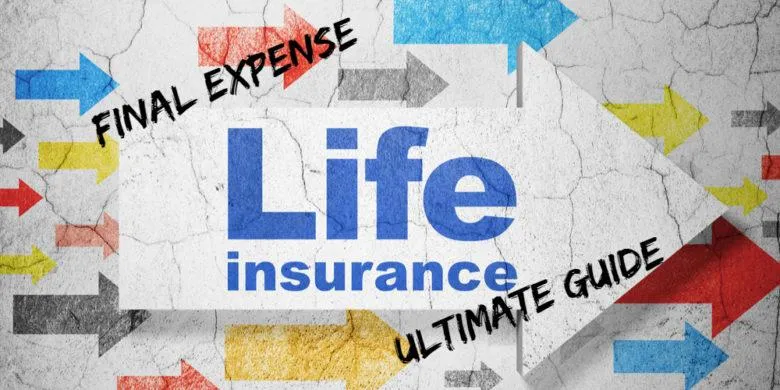
Ultimate Guide For Final Expense Life Insurance
Although it is never too early to begin making plans for the future, it can be challenging to know where to start. We are prepared to assist you in navigating the world of final expense life insurance, ensuring that you and your loved ones are financially protected during this difficult time.
In this comprehensive guide, we will cover everything you need to know about final expense life insurance, including how much coverage to acquire, who should buy it, and what questions you should have before purchasing. With this information, you can make an informed decision and provide your family with the peace of mind they deserve.
What is a Final Expense Insurance Policy?
A final expense insurance policy is a type of life insurance designed to cover the costs associated with a person's passing, such as funeral expenses, medical bills, and other related charges. This policy offers cash support to the policyholder's beneficiaries, allowing them to cover these expenses without the added emotional and financial burden during a trying time.
Compared to traditional life insurance policies, final expense insurance typically has lower coverage amounts and is easier to qualify for. This makes it a suitable option for individuals, particularly seniors, who want to ensure their loved ones are not left with the financial responsibility of their final arrangements.
Final Expense Life Insurance for Seniors
Seniors frequently choose final expense life insurance due to its affordability and lower payout amounts. These policies focus solely on covering funeral and related expenses, rather than attempting to replace lost income due to a person's death. This is particularly appealing to retirees who have already paid off their mortgages and have no dependent children.
Despite not needing traditional life insurance, seniors may still leave behind significant debts, with the National Funeral Directors Association estimating that the average cost of a funeral can exceed $9,000. Final expense life insurance can help alleviate this financial burden, ensuring that your loved ones are not left to shoulder the cost of your final arrangements.
If you have ever dealt with the loss of a loved one, you understand the emotional and practical challenges that come with planning a funeral and managing the associated financial obligations. The prospect of your partner or children facing a similar situation after your passing can be devastating. Final expense life insurance can help protect your loved ones from this burden, giving them the peace of mind they need during a difficult time.
How Much Does Final Expense Insurance Cost
The cost of final expense insurance can vary depending on several factors, including the policyholder's age and health status. Generally, younger individuals can lock in lower rates before their premiums significantly increase with age or the onset of medical conditions.
The table below provides sample rates for final expense insurance, demonstrating that younger individuals typically enjoy lower premiums:
As the data shows, the cost of final expense insurance is often lower when a person is younger. This encourages many seniors to enroll in these policies as soon as possible, securing affordable rates before their premiums rise due to age or health factors.
Common Questions About Final Expense Life Insurance
Even though final expense insurance is generally easier to qualify for compared to other life insurance policies, there are still crucial questions to consider before making a purchase. Let's address some of the most common inquiries:
How do I know when my final expense insurance expires? Final expense insurance policies are a subset of whole life insurance, which means they do not have an expiration date. As long as you continue making timely premium payments, your coverage will remain in effect.
Can I get life insurance without a medical exam? In some cases, you may be able to obtain final expense insurance without undergoing a medical examination. These policies often rely more on the answers to questionnaires or interviews than on physical examinations, particularly when the coverage amount is less than $50,000.
What features are included in a final expense policy? The specific features included in a final expense policy will depend on the life insurance provider. Some companies may offer additional benefits, such as coverage for dismemberment, accidental death, or various riders. It's important to carefully review the policy details to ensure it aligns with your needs and preferences.
What can the death benefit from a final expense insurance policy be used for? Although final expense insurance is designed to cover funeral and related expenses, the death benefit can be used for any purpose, including paying off debts from credit cards, mortgages, or medical bills. The beneficiaries have the ultimate decision on how to use the funds, ensuring that the money is not wasted.
What is the Average Cost of Final Expense Insurance? The average cost of final expense insurance can vary significantly, ranging from $30 to $70 per month. However, this range can be influenced by factors such as the policyholder's age and any underlying health conditions, including diabetes.
Individuals over the age of 70 or those with serious health issues may expect to pay between $70 and $120 per month for their final expense coverage, though rates outside of this range may also be available.
On the other hand, younger candidates without significant medical conditions may qualify for premiums at the lower end of the spectrum, typically between $20 and $50 per month. It's important to note that lower premiums often correlate with fewer features and benefits for the beneficiaries.
When considering the cost of final expense insurance, it's crucial to factor in the potential for additional expenses that may arise after a loved one's passing, such as outstanding debts from credit cards, medical bills, and other liabilities. These expenses can significantly impact the financial burden on the family, and a well-designed final expense policy can help alleviate this burden.

Final Expense Insurance and Medical Costs
The majority of Americans who pass away are Medicare beneficiaries, with the cost of healthcare often exceeding expectations. Chronic illnesses require expensive medical treatments, and health insurance frequently does not cover all of a person's needs during the final year of life, when hospitalizations and hospice care incur significant costs.
Only two-thirds of the healthcare costs for older patients are covered by Medicare and Medicaid, and the average annual healthcare expenditure per person is $18,424. In 2016, Medicare spent an average of $153 per day on hospice care, which included routine home care at $193 per day, ongoing home health care at $41 per day, short-term care at $173 per day, and standard hospital services at $744 per day.
By purchasing final expense life insurance, individuals can protect their loved ones from the unexpected medical expenses that may arise at the end of life, ensuring that the financial burden does not fall solely on the surviving family members.
Final Expense Insurance and Debt Left Behind The average American dies with approximately $61,554 in debt, which can include student loans, auto loans, personal loans, and credit card obligations. Before transferring any assets to surviving family members, the decedent's estate pays off as many of these debts as possible. Unfortunately, this can leave little to no resources for the family to cover the final expenses.
Final expense life insurance can help alleviate this financial burden, providing a death benefit that can be used to pay off outstanding debts and cover the costs of the funeral and other related expenses. This can give the family peace of mind during a difficult time, knowing that the financial obligations are being taken care of.
Final Expense Insurance and Funeral Costs The average cost of an adult funeral, including viewing and burial, was $8,755 in 2017. Depending on the casket material or the cost of opening and closing the grave, funeral expenses can quickly escalate into the thousands of dollars.
To address this growing financial burden, insurance companies offer final expense plans, often referred to as "funeral" or "burial" insurance policies, to cover these end-of-life expenses. Over the years, the cost of funerals has risen significantly, with the average cost of a funeral without a vault increasing from $700 in 1960 to at least $7,640 in 2019. When adding the cost of grave markers, obituaries, and memorial services, the total can easily approach $10,000.
Final expense life insurance provides a death benefit that can be used to pay for these funeral-related expenses, ensuring that your loved ones are not left to shoulder the financial burden during an already emotionally challenging time.
Shopping for a Final Expense Insurance Quote Online The cost of final expense insurance can vary widely depending on the provider and the specific policy features. What may be the most affordable coverage from one company may not be the best choice when compared to another policy, as each insurer calculates rates differently.
To help you navigate the options and find the most suitable policy for your needs, it's recommended to speak with an agent who is familiar with the various insurance providers. These agents can provide you with free quotes based on your specific requirements, allowing you to make an informed decision.
When selecting a final expense plan, it's crucial to consider several key factors, such as how the provider will protect your family, the typical claims payout timeframe, and whether they will handle the funeral arrangements or leave it to your loved ones.
By taking these considerations into account, you can choose the insurance company that will provide you and your family with the greatest peace of mind during this difficult period.
Danny Ray, the founder of BestBurialPolicy.com, has been specializing in final expense life insurance for almost 30 years. His company is known for its quick application process, which only requires applicants to answer a few health-related questions on a one-page form, without the need for a medical exam.
What sets BestBurialPolicy.com apart is the support they provide to the policyholder's loved ones in the event of their passing. By assisting with the burial arrangements, the company aims to ease the process and reduce the stress during this sensitive time.
Pros and Cons of Final Expense Life Insurance The primary advantage of a final expense policy is that it can spare your loved ones the financial burden of paying for your funeral and other end-of-life expenses. Funeral costs can easily exceed $10,000, with casket prices ranging from $1,000 to $10,000 depending on the style and material.
By obtaining a more affordable final expense plan, you can protect your closest family members from the financial challenges that often arise when preparing for a funeral. Families frequently experience financial difficulties when they are left to cover these expenses without the support of a life insurance policy.
Final expense insurance is a type of whole life insurance, meaning it is a permanent policy that lasts until the policyholder's death. The death benefit and premium typically remain the same for the life of the policy, and some policies even build up cash value over time.
One of the key advantages of final expense insurance is its lower coverage levels compared to traditional life insurance policies. This makes it easier to qualify for, as the application process often only requires answering health-related questions, without the need for a medical exam.
However, the primary disadvantage of a final expense policy is its significantly lower face amount compared to other life insurance options, such as term life insurance. It's important to keep in mind that the beneficiaries can use the death benefit for any purpose, not just funeral expenses, which provides some flexibility.
Why Do You Need Final Expense Insurance? There are several compelling reasons why final expense insurance is essential:
Financial protection for loved ones: Final expense insurance shields your family from the financial burden of funeral and medical costs associated with end-of-life care, providing them with comfort and support during a difficult time.
Accessibility and affordability: Final expense insurance is more accessible and affordable than standard life insurance, making it a practical option for those who may not qualify for or afford traditional coverage due to age, health concerns, or financial limitations.
Financial legacy: Final expense insurance can be a way to leave a financial legacy for your beneficiaries, providing them with a specific amount that can help address their needs or improve their financial situation.
In summary, end-of-life insurance relieves your loved ones of the financial strain associated with final arrangements and provides them with a sense of financial security during a time of grief and upheaval.
Who Is Final Expense Insurance Best For? When it comes to life insurance, final expense coverage is an excellent choice for senior citizens. This type of insurance focuses on covering the costs of funeral arrangements and other final expenses, which can be a significant financial burden for surviving loved ones.
Final expense insurance, also known as burial insurance, is designed to address the specific needs of senior consumers, who may not always feel comfortable navigating complex financial products. The emphasis on funeral planning makes these policies straightforward and easy to understand.
Additionally, final expense insurance is reasonably priced, often without the requirement of a medical exam, which makes it more accessible for senior individuals who may have limited financial resources or health concerns.
How Do You Apply for Final Expense Life Insurance? The application process for final expense life insurance typically involves a brief form, ranging from one to two pages in length. These applications will ask questions about your height, weight, family medical history, and regular activities.
Some insurance providers have more extensive applications with numerous health-related inquiries that may require diagnostic tests, such as blood and urine samples. However, BestBurialPolicy.com's application process differs, as it only requires the basic health-related questions, without the need for any additional tests.
Depending on the type of insurance, the application can be completed online or over the phone. Your insurance provider will provide you with a free estimate that includes any applicable discounts. In some cases, policies can be purchased directly over the phone without further interaction, though face-to-face discussions are still recommended to ensure all your questions are addressed before acquiring any policies.

Pre-Qualifying Questions for Final Expense Insurance The majority of final expense insurance applications focus primarily on the applicant's health timeline, typically considering the past two years. Here are some of the most common pre-qualifying questions:
Have you ever been diagnosed with HIV/AIDS, been bedridden, resided in a care facility, been hospitalized, or received hospice care?
Do you have a heart condition, such as congestive heart failure, or have you had a stroke?
Have you abused alcohol within the last two years?
Has it been more than two years since your last cancer diagnosis?
Do you have Alzheimer's disease?
Even if you have pre-existing conditions, you may still be eligible for coverage. The key questions to consider are:
Do you want coverage despite your declining health?
Do any members of your family rely on your income to make ends meet?
Is a final expense life insurance policy a reasonable way to cover funeral costs and other death-related obligations, such as unpaid medical bills or debts left behind?
Do you have conditions that may preclude coverage, such as type 2 diabetes? (Most people can still obtain final expense insurance even with past health issues.)
Coverage Levels for Final Expense Insurance The typical final expense insurance policy ranges from $10,000 to $20,000 in coverage, although the majority are under $50,000. In some cases, applicants who qualify for an adjusted plan may receive a lower cost than a standard final expense policy, depending on their health and the specific coverage options they select.
These adjusted plans, often referred to as "modified" policies, offer the applicant coverage with an extended waiting period. If the insured individual survives the waiting period, they will receive a full refund of their premium payments, plus a small loyalty bonus.
The final expense insurance sector provides a variety of plans to accommodate the needs and financial constraints of the policyholder. Some insurance providers offer 10- or 20-year payment plans, allowing applicants to pay off the policy in full within those timeframes. While these plans will have higher premiums, they may be more cost-effective in the long run, as they include charges for burial expenses like casket and vault fees.
Insurance Tips for End-of-Life Preparation When applying for final expense insurance, it's crucial to provide complete and honest answers about your health and medical history. Insurance companies will likely review the records after the policyholder's passing to verify the accuracy of the information provided, and any discrepancies could result in coverage denial.
It's also essential to prepare in advance by researching local funeral expenses. Reach out to a local funeral home to obtain a general cost list, which will give you a better understanding of the potential expenses your loved ones may face.
Additionally, it's helpful if the person handling your affairs has access to all the relevant paperwork, including your preferences for the funeral, such as desired flowers or music. This can help ease the burden on your loved ones during a difficult time.
Regularly reviewing your insurance coverage is crucial, as funeral costs continue to rise, and your health may unexpectedly change as you age. Maintaining adequate life insurance coverage is an investment that can provide invaluable support to your loved ones when they need it most.
Types of Beneficiaries When you pass away, who will receive the benefits from your life insurance policy? There are three main types of beneficiaries:
Primary Beneficiary: The first person named as the beneficiary by the insured.
Contingent Beneficiary: The individual(s) designated to receive the benefits if the primary beneficiary is no longer living within 30 days of the insured's death.
Tertiary Beneficiary: The individual(s) who will receive the benefits if both the primary and contingent beneficiaries are unavailable.
It's important to clearly define the proportions in which each beneficiary should receive the death benefit, and to ensure that your loved ones are aware of these designations in advance. This will help avoid any misunderstandings or disputes when the time comes to distribute the funds.
Naming your adult children as primary beneficiaries on your life insurance policies can simplify the distribution process. Be sure to provide their relevant details, such as address, phone number, and date of birth, to the insurance company, so they can quickly confirm the beneficiaries' identities if a claim needs to be filed.
Remember to keep your beneficiaries informed and update their contact information if it changes. Maintaining open communication about your life insurance coverage is crucial to ensure your wishes are carried out and your loved ones are protected.
Pre-Paid or Pre-Need Funeral Plans Before prepaying for your funeral, it's important to thoroughly understand how the funds will be stored and what specific services they can cover. If you order the service in advance, you may be able to lock in a particular price, so keeping thorough records is essential.
However, prepaying for a funeral is not always the best option, and you need to understand the details carefully. Prepaid funeral plans typically offer less flexibility than final expense insurance, as the funds can only be used to cover funeral expenses, and not any other desired
Evaluate quotes from leading insurance providers
Compare quotes from top insurance carriers
Best Plan For Me
Qualified Health Impairments
This site provides life insurance information and quotes. Each rate shown is a quote based on information provided by the carrier. No portion of BestBurialPolicy.com may be copied, published or distributed in any manner for any purpose without prior written authorization of the owner.




